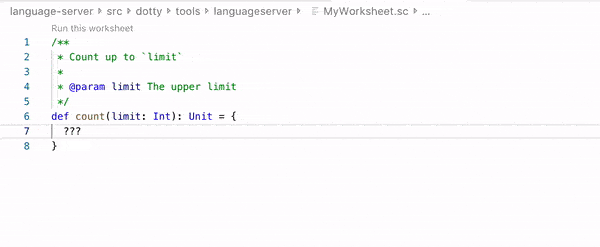Announcing Dotty 0.11.0-RC1
Today we are excited to release Dotty version 0.11.0-RC1. This release serves as a technology preview that demonstrates new language features and the compiler supporting them.
Dotty is the project name for technologies that are considered for inclusion in Scala 3. Scala has pioneered the fusion of object-oriented and functional programming in a typed setting. Scala 3 will be a big step towards realising the full potential of these ideas. Its main objectives are to
- become more opinionated by promoting programming idioms we found to work well,
- simplify where possible,
- eliminate inconsistencies and surprising behaviours,
- build on strong foundations to ensure the design hangs well together,
- consolidate language constructs to improve the language’s consistency, safety, ergonomics, and performance.
You can learn more about Dotty on our website.
This is our 11th scheduled release according to our 6-week release schedule.
What’s new in the 0.11.0-RC1 technology preview?
Opaque Type Aliases
Opaque types aliases provide type abstraction without any overhead. Example:
opaque type Duration = Long
This introduces Duration as a new type, which is implemented as a Long but is different from it. The fact that Duration is the same as Long is only known in the companion object of Duration. Here is a possible companion object:
object Duration {
// These are the ways to lift to the Duration type
def fromNanos(duration: Long): Duration = duration
def fromSeconds(duration: Long): Duration = duration * 1000000000
// This is the first way to unlift the Duration type
def toNanos(l: Duration): Long = l
// Extension methods define opaque types' public APIs
implicit class DurationOps(self: Duration) extends AnyVal {
// This is the second way to unlift the Duration type
def toSeconds: Long = self / 1000000000
def + (that: Duration): Duration = self + that
}
}
The companion object contains the fromNanos and fromSeconds methods that convert from longs to Duration values. It also adds a toNanos function and a decorator that implements + on duration values, as well as a conversion toSeconds. All of this is possible because within object Duration, the type Duration is just an alias of Long.
Outside the companion object, Duration is treated as a new abstract type. So the following operations would be valid because they use functionality implemented in the Duration object.
val d1 = Duration.fromNanos(1000L)
val d2 = Duration.fromSeconds(2L)
val d3 = d1 + d2
But the following operations would lead to type errors:
val l: Long = d1 // error: found: Duration, required: Long
val d: Duration = 3L // error: found: Long(3L), required: Duration
d1 + 2L // error: found: Long(2L), required: Duration
d1 - d2 // error: `-` is not a member of Duration
Worksheet Mode Support in Visual Studio Code
Dotty IDE can now be used in Worksheet mode. A worksheet is a Scala file that is evaluated on save, and the result of each expression is displayed in a column on the right of your program. Worksheets are like a REPL session on steroids, and enjoy 1st class editor support: completions, hyperlinking, interactive errors-as-you-type, etc.

For more information about the worksheets, see Worksheet mode with Dotty IDE
Various IDE improvements
Help with method signatures
When writing a method call, Dotty IDE will now show contextual information that helps filling in the arguments of the method.

Improved display of documentation in Dotty IDE
In this release, we reworked how we show documentation inside the IDE. We now extract useful information from the Scaladoc comment, then format it before we display it in the IDE.

And much more!
Please read our release notes for more details!
Trying out Dotty
sbt
You can set up a new sbt project with Dotty as the compiler by running:
sbt new lampepfl/dotty.g8
For more details on using Dotty with sbt, see the example project.
Mill
The Mill build tool version 0.2.6 introduced experimental support for Dotty. For more details on using Dotty with Mill, see the example project.
IDE support
Start using the Dotty IDE in any Dotty project by following the IDE guide.
Standalone installation
Releases are available for download on the Releases section of the Dotty repository: https://github.com/lampepfl/dotty/releases
For macOS users, we also provide a homebrew package that can be installed by running:
brew install lampepfl/brew/dotty
In case you have already installed Dotty via brew, you should instead update it:
brew upgrade dotty
Let us know what you think!
If you have questions or any sort of feedback, feel free to send us a message on our Gitter channel. If you encounter a bug, please open an issue on GitHub.
Contributing
Thank you to all the contributors who made this release possible!
According to git shortlog -sn --no-merges 0.10.0..0.11.0-RC1 these are:
143 Martin Duhem
104 Nicolas Stucki
82 Martin Odersky
60 Guillaume Martres
35 Allan Renucci
21 poechsel
12 Olivier Blanvillain
10 Liu Fengyun
8 Aleksander Boruch-Gruszecki
6 Tobias Bordenca
5 Sébastien Doeraene
4 Stéphane Micheloud
3 João Pedro Evangelista
3 Miles Sabin
3 Neeraj Jaiswal
3 Abel Nieto
2 Ólafur Páll Geirsson
2 Fengyun Liu
2 veera venky
1 mikhail
1 Glavo
1 0xflotus
1 Paolo G. Giarrusso
If you want to get your hands dirty and contribute to Dotty, now is a good time to get involved! Head to our Getting Started page for new contributors, and have a look at some of the good first issues. They make perfect entry points into hacking on the compiler.
We are looking forward to having you join the team of contributors.
Library authors: Join our community build
Dotty now has a set of widely-used community libraries that are built against every nightly Dotty snapshot. Currently this includes ScalaPB, algebra, scalatest, scopt and squants. Join our community build to make sure that our regression suite includes your library.
